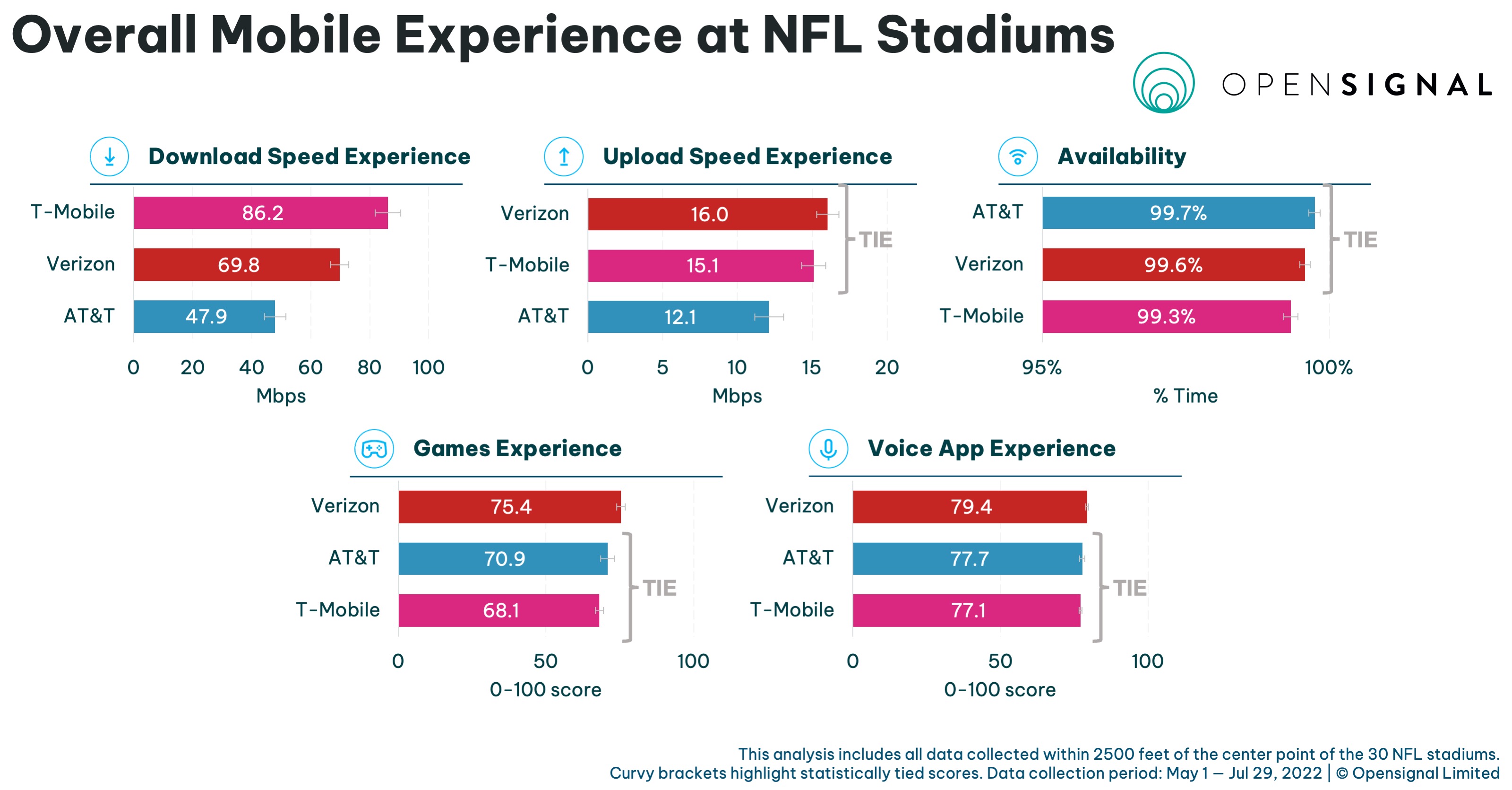With the 103rd season of the National Football League (NFL) starting on September 8, 2022 — tens of thousands of dedicated fans will come to football stadiums across the U.S. to cheer for their teams. Ahead of this new season, Opensignal is revisiting its previously published analysis, to see on which network our users had the best mobile network experience at NFL stadiums.
In this new analysis, we found that our users on Verizon’s network enjoyed the fastest 5G speeds, the best 5G and overall gaming, and top 5G and overall voice app experiences. However, T-Mobile users connected to 5G services for the highest amount of time at the 30 NFL stadiums and users on T-Mobile’s network saw the highest average overall Download Speed Experience.
 Verizon users saw the fastest average 5G download speed at NFL stadiums, clocking in at a stunning score of 317.3 Mbps — 72.8% higher than the speed our users saw on T-Mobile’s network and 4.6 times more than those on AT&T’s network. Verizon also tops 5G Upload Speed, with a score of 30.2 Mbps — 8.1 Mbps ahead of T-Mobile and nearly twice as fast as AT&T.
Verizon users saw the fastest average 5G download speed at NFL stadiums, clocking in at a stunning score of 317.3 Mbps — 72.8% higher than the speed our users saw on T-Mobile’s network and 4.6 times more than those on AT&T’s network. Verizon also tops 5G Upload Speed, with a score of 30.2 Mbps — 8.1 Mbps ahead of T-Mobile and nearly twice as fast as AT&T.
It’s little surprise to see Verizon command substantial leads over the competition in its users' 5G speeds because of Verizon’s use of mmWave for 5G in busy locations. Since Verizon entered an official partnership with the NFL in 2021, it has focused on deploying high-capacity mmWave-based 5G infrastructure at NFL stadiums since 2019 and has rolled out its 5G Ultra Wideband network in more than 70 stadiums and sports venues nationwide.
Our 5G users on Verizon’s network also had the best available experience when playing real-time multiplayer mobile games and using over-the-top (OTT) voice services at NFL stadiums over 5G connections. For 5G Games Experience, Verizon rated as Good (75-85) — a score that represents an experience where which most users deemed acceptable and did not experience a delay between their actions and the game. Both AT&T and T-Mobile were in a statistical tie in the 71-71.4 points range placed in a category below — Fair (65-75). This score represents an experience that users found average and the majority of players reported that they noticed a delay between their actions and the outcomes in the game. Verizon also was the only operator to place in the Good (80-87) category for 5G Voice App Experience — above AT&T and T-Mobile, who rated as Acceptable (74-80).
However, our 5G users on T-Mobile’s network connected to 5G services for the highest amount of time out of all three national U.S. operators — 56.3% of the time. This was more than twice the time AT&T users spent connected to 5G, and over three times Verizon’s 5G Availability score.

Turning to the overall mobile network experience of all users connecting with all technology generations, our users on T-Mobile saw the fastest average overall download speeds. Their score of 86.2 Mbps was 23.5% faster than the speeds using Verizon and nearly 80% faster than those of our AT&T users.
However, T-Mobile and Verizon were in a statistical tie on Upload Speed Experience with a score of around 3.4 Mbps ahead of third-placed AT&T. Similarly to the 5G categories, Verizon scored the highest in Games Experience and Voice App Experience, while AT&T and T-Mobile were statistically tied in both categories. In general, our users didn’t struggle connecting to mobile services at NFL stadiums, as they connected to services better than 2G for at least 99.3% of the time and saw very little time without a signal or on a 2G network.
U.S. operators have been investing in improving connectivity infrastructure around the stadiums, with a notable example of the SoFi Stadium in Los Angeles, where Super Bowl LVI took place this February. The use of 5G services to enhance fans’ experience at the stadiums has become one of the most exciting 5G use cases. Fans can enjoy a more personalized and immersive experience as they can watch the game in real-time from multiple angles. This requires a large amount of bandwidth and low latency, particularly in high-traffic areas like football stadiums — which 5G technology is capable of providing, especially with the use of mmWave and mid-band spectrum frequencies.
Opensignal Limited retains ownership of this insight including all intellectual property rights, data, content, graphs & analysis. Reports and insights produced by Opensignal Limited may not be quoted, reproduced, distributed, published for any commercial purpose (including use in advertisements or other promotional content) without prior written consent. Journalists are encouraged to quote information included in Opensignal reports and insights provided they include clear source attribution. For more information, contact [email protected].
